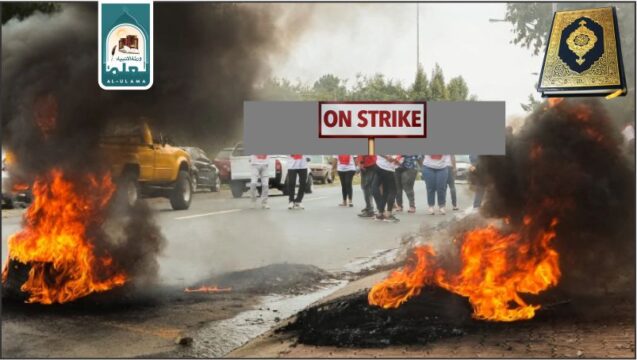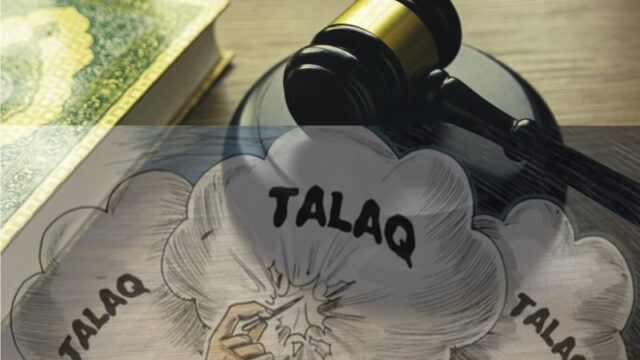Question
In our times, the statements and videos on Media and Internet of an individual known by the name of “Mirza Muhammad Ali Jehlumi”, are famous on many companions (May Allah be pleased with them), the Imams of the religion and many agreed upon matters of the creed. Some scholars think that we should ignore this person and his Fitnah (turmoil) will extinguish by itself with the passing of time, but many scholars believe that since the laymen are requesting that the reality of this individual should be made clear, and looking at his beliefs and views, an agreed upon statement should be issued concerning him. Below we will mention some statements and beliefs of this mentioned Mirza, so the noble scholars and great Muftis, in light of them, can guide us.
Disrespect towards noble Companions:
- The choosing of Abu Bakr (may Allah be pleased with him) in Shaqifah Bani Sa’adah was a huge mistake which lead to the ruin and bloodshed of the community. If Abu Bakr (may Allah be pleased with him) was alive today, he himself would have cried on this choice.
- According to the authentic political spirit of Islam, the caliphate is only that of Ali (may Allah be pleased with him)
- Allah is not pleased with all the companions, only the 1400 companions of the pledge of allegiance have a certificate of Allah being pleased with them, and considering all the companions as being under the satisfaction of Allah is an alteration in the meaning of the Quran.
- All the companions are not guaranteed paradise, the verse 10 in Surah Al-Hadid: “But to all Allah has promised the best [reward]” means that (after being punished for their actions) at the end, the companions will enter paradise.
- The noble companions who embraced Islam at the conquest of Makkah read the testimony of faith out of fear of death.
- The one who reads the Quran today on his mobile will obtain more reward than the noble companions who read the Quran from memory
- Many companions became apostate after the death of the Prophet (ﷺ), these are those who will be stopped at the Hawd of Kawthar, those who were companions during the life of the Prophet (ﷺ).
- The Prophet (ﷺ) was displeased with some companions at the time of his death and he passed away being displeased with them.
- My heart is not clean for those companions who differed with Ali (may Allah be pleased with him), I have displeasure in my heart about them.
- (Pointing towards the internal disputes of the noble companions in the battles of Jamal and Siffin), those who did not pledge allegiance to Ali (may Allah be pleased with him), who was in reality also an Imam and a rightly guided caliph, they died upon ignorance (Jahiliyah).
- The call established by the Prophet (ﷺ), how much purification he performed, but after 30 years there were cracks in this call and what was the cause of it? It was because of wealth (meaning that the internal disputes between the companions was due to wealth and not due to Ijtihad)
- There is the mention of 12 hypocrites in Sahih Muslim and the Messenger of Allah (saw) said about 8 of them that they will die from the Dubaylah spots. He tried to give the impression that these 8 or some of them were those whom Ahlus Sunnah call companions.
- The greatest helper of Musa (peace be upon him) was Harun (peace be upon him). The same level of helper for the Prophet (ﷺ) were neither Abu Bakr (may Allah be pleased with him) nor Umar (may Allah be pleased with him) rather only Ali (may Allah be pleased with him)
- On the spiritual level, Ali (may Allah be pleased with him) was the first caliph while politically Abu Bakr (may Allah be pleased with him) was the first caliph.
- The Prophet (ﷺ) gave the status of sainthood (Wilayah) to Ali (may Allah be pleased with him)
- The position of those who rebelled against Uthman (may Allah be pleased with him) was totally right. Uthman (may Allah be pleased with him) was besieged and martyred by the companions due to his mistakes.
- Uthman (may Allah be pleased with him) committed many mistakes in running the system of caliphate because of which people stood against him
- The Prophet (ﷺ) expelled Khalid ibn Waleed (may Allah be pleased with him) from companionship
- Cursing the companions is the way invented by Mu’awiyah, I feel no shyness in declaring it to be an innovation.
- Mu’awiyah (may Allah be pleased with him) would curse Ahlul Bayt and would instruct others to do it.
- Mu’awiyah, Mugheerah ibn Shu’bah, Amr ibn Al-Aas (may Allah be pleased with them) have “Ummat nal Kam Paya e” (meaning they have committed a great fraud against the community)
- Writing the revelation is not a virtue, Mu’awiyah (may Allah be pleased with him) was recruited through recommendation.
- I say “May Allah be pleased” with Mu’awiyah so people should not consider that Allah is satisfied with him.
- For Ahlus Sunnah, the defence of Mu’awiyah (may Allah be pleased with him) and the love of Ali (may Allah be pleased with him) are like fire and water, they cannot gather in one heart.
- Mu’awiyah (may Allah be pleased with him) would oppose the Sunnah on purpose in many matters and would make others do so and the people would oppose the Sunnah in fear of him.
Animosity towards the Imams of the religion and Ahlus Sunnah
- Imam Tirmidhi was affected with the disease of Nasibiyat and sectarianism and Banu Umayah filled the heart of the Tabi’i Ibrahim Nakh’i with the hate of Ahlul Bayt
- Muhammad ibn Qasim did not come to India for the victory of Islam rather he came to commit injustice against members of Ahlul Bayt
- Imam Bukhari made a Hadith vague…he was afraid of Banu Umayah…but Ahadith could not be hidden and those coming after him narrated them completely…
- Those Imams who forbid mentioning the conflicts between the Companions, we should check their circumcisions to see if they are Muslims or not.
- The punishment of insulting the Prophet (ﷺ) is not death. The book written by Ibn Taymiyah (As-Sarim Al-Maslool) regarding the punishment of insulting the Prophet (ﷺ) being death, if he was alive today I would male a case against him in an international court because of this book.
- “Do not insult my companions” and “He was writing revelation”…the scholars of Ahlus Sunnah (all Deobandi, Brelwi, Ahl e Hadith) who mention that much Hadith are scholarly treacherous, thieves and are playing the role of Jews.
Showing kindness to Qadiyaniyat and Ghamidiyat
- Qadiyanis are better than the people of the Book
- Mirza Ghulam Ahmad Qadiyani did not affirm anywhere clearly the claim of Prophethood
- Ghamidi is a scholar speaking the truth
- Regarding music, usury, and the punishment of insulting the Prophet (ﷺ) and other matters, listen to Ghamidi
- A person other than a prophet doing Mubahalah is synonymous to claiming prophethood, only a Prophet can do Mubahalah.
Showing kindness to Rafidiyat:
Some of his beliefs regarding all the noble companions in general and some in particular are borrowed from the Rawafid as mentioned at the beginning, but with this in the following matters, he also showed kindness towards Rafidiyat:
- The time of Iftari (open fasting) of Rawafid is correct, and waiting for 24 minutes is totally correct and cannot be blamed.
- Rawafid prostrate on a stone of sand and this action is closer to the Sunnah.
- Nahj Al-Balaghah contains more the mention of Tawheed than the books of Hadith of Ahlus Sunnah (including Sahih Bukhari)
Note: All these beliefs and views of Mirza are taken from his videos and statements, and none of these matters have been mentioned outside their context. To listen to these matters and much more from the tongue of Mirza himself, you can watch the following link:
Seeker of the religious verdict: (Dr) Hafiz Abu Yahya Noorpuri (may Allah preserve him)
Answer
All praises belong to Allah alone, and may the Salah and Salam be upon the one after whom there is no prophet!
- The person holding such beliefs and views is an innovator and a misguided person; he has no link with Ahlus Sunnah, Ahlul Hadith and the Manhaj of the Salaf.
- This individual criticised many companions naming them such as Abu Bakr, Umar, Uthman, Mu’awiyah, Talhah, Zubayr, Aishah, Mugheerah ibn Shu’bah, Abu Musa Al-Ash’ari, Amr ibn Al-‘Aas, may Allah be pleased with them all, and tried to declare the integrity and trustworthiness of many companions as doubtful. Speaking about the noble companions with such an audacity is the Manhaj of the Rafidis and not the way of Ahlus Sunnah and Ahlul Hadith.
The noble companions (may Allah be pleased with them) are those high entities about whom there is a testimony in the Quran, Allah (Ta’ala) said:
{أُولَئِكَ كَتَبَ فِي قُلُوبِهِمُ الْإِيمَانَ وَأَيَّدَهُمْ بِرُوحٍ مِنْهُ وَيُدْخِلُهُمْ جَنَّاتٍ تَجْرِي مِنْ تَحْتِهَا الْأَنْهَارُ خَالِدِينَ فِيهَا رَضِيَ اللَّهُ عَنْهُمْ وَرَضُوا عَنْهُ أُولَئِكَ حِزْبُ اللَّهِ أَلَا إِنَّ حِزْبَ اللَّهِ هُمُ الْمُفْلِحُونَ}
“For those ˹believers˺, Allah has instilled faith in their hearts and strengthened them with a spirit from Him. He will admit them into Gardens under which rivers flow, to stay there forever. Allah is pleased with them and they are pleased with Him. They are the party of Allah. Indeed, Allah’s party is bound to succeed.” (Mujadilah: 22)
The Prophet (ﷺ) said:
“لا تسبوا أصحابي، فوالذي نفسي بيده لو أن أحدكم أنفق مثل أحد ذهبا ما أدرك مُدّ أحدهم ولا نصيفه”.
“”Do not abuse my companions for if any one of you spent gold equal to Uhud (in Allah’s Cause) it would not be equal to a Mud or even a half Mud spent by one of them.” (Bukhari 3673, 2540)
At the end of Surah Fath, Allah (Ta’ala) said mentioning the virtues of the Prophet (ﷺ) and his noble companions:
{لِيَغِيظَ بِهِمُ الْكُفَّارَ}
“In this way Allah makes the believers a source of dismay for the disbelievers” (Al-Fath: 29)
Imam Malik (may Allah have mercy on him) said:
“من أصبح من الناس في قلبه غيظ على أحد من أصحاب رسول الله، فقد أصابته هذه الآية.”
“Whoever among people holds animosity in his heart towards any of the companions of the Messenger of Allah, this verse includes him” (Tafsir Al-Qurtubi 16/298).
Meaning that the critics of the companions are fellows of the disbelievers. Imam Qurtubi explains this: “Because these people in reality are involved in refuting the Lord of the universe and rejecting Quran and Hadith” (same reference as previous)
Imam Ahmad (may Allah have mercy upon him) said:
“إذا رأيت رجلاً يذكر أحداً من الصحابة بسوء فاتهمه على الإسلام.”
“If you see a person mentioning any of the companions in a bad manner, suspect his Islam” (Al-Bidayah wan Nihayah 8/142)
Imam Abu Zur’ah Razi (may Allah have mercy on him) said:
“إذا رأيت الرجل ينتقص أحداً من أصحاب رسول الله صلى الله عليه وسلم فاعلم أنه زنديق، وذلك أن الرسول صلى الله عليه وسلم عندنا حق، والقرآن حق، وإنما أدى إلينا هذا القرآن والسنة أصحاب رسول الله صلى الله عليه وسلم وإنما يريدون أن يجرحوا شهودنا ليبطلوا الكتاب والسنة، والجرح بهم أولى، وهم زنادقة.”
“If you see a person reviling any of the companions of the Messenger of Allah (saw), know that he is a Zindeeq (heretic) and this because the Messenger of Allah (ﷺ) is the truth for us, and the Quran is truth, and this Quran and Sunnah reached us through the Companions of the Messenger of Allah (ﷺ). These people want to invalidate our witnesses so they can cancel the Book and the Sunnah, and they deserve more to be invalidated and they are heretics” (Al-Kifayah lil Khateeb 98)
Imam Tahawi (may Allah have mercy on him) said while mentioning the creed of the Muslims regarding the noble companions:
“ونحب أصحاب رسول الله صلى الله عليه وسلم، ولا نفرط في حب أحد منهم ، ولا نتبرأ من أحد منهم ، ونبغض من يبغضهم، وبغير الخير يذكرهم، ولا نذكرهم إلا بخير، وحبهم دين وإيمان وإحسان، وبغضهم كفر ونفاق وطغيان.”
“We love the companions of the Messenger of Allah (saw) and we do not exaggerate in the love of any of them nor we disown any of them, and we hate those who hate them and speak ill of them, and we do not mention them except with good, and loving them is part of religion, part of faith and part of perfection (Ihsan), and hating them is disbelief, hypocrisy and transgression” (Al-Aqidah At-Tahawiyah 57)
- His statements regarding the predecessors of this community and the Imams of the religion such as the Tabi’i Imam Muhammad ibn Sireen, the Tabi’i Imam Ibrahim Nakh’i, Imam Bukhari, Imam Tirmidhi, Imam ibn Taymiyah, may Allah have mercy upon them, make it clear that with reviling the noble companions, he is also reviling the scholars and Muhadithin, which is a clear and intelligible sign of his misguidance.
One can estimate the status and nobility of scholars by the fact that Allah (Ta’ala) mentioned them alongside angels as witnesses, He said:
{شَهِدَ اللَّهُ أَنَّهُ لَا إِلَهَ إِلَّا هُوَ وَالْمَلَائِكَةُ وَأُولُو الْعِلْمِ}
“Allah ˹Himself˺ is a Witness that there is no god ˹worthy of worship˺ except Him—and so are the angels and people of knowledge” (Aal Imran: 18)
The Prophet (ﷺ) said:
“إِنَّ الْعُلَمَاءَ وَرَثَةُ الْأَنْبِيَاءِ”.
“Verily the scholars are the inheritors of the Prophets” (Sunnan Abi Dawood: 3641)
Imam Tahawi (may Allah have mercy on him) said:
“علماء السلف من السابقين ومن بعدهم من التابعين أهل الخير والأثر وأهل الفقه والنظر لا يذكرون إلا بالجميل ومن ذكرهم بسوء فهو على غير السبيل.”
“The scholars of the Salaf from the early predecessors and those after them from the Tabi’is, the people of good, the people of narrations and the people of jurisprudence and thought, are not mentioned except with good, and whoever mentions them in a bad manner, he is deviating from the path” (Al-Aqidah At-Tahawiyah: 57)
The truth is that whoever created a religious Fitnah or ideological corruption, he first created a bad thought about the scholars among the laymen, as he knew that his opinions will have no weight as long as people refer to the scholars or are happy to listen to them. The Mirza mentioned tried to create such a bad impression about the scholars to his followers that they will not be ready to listen to scholars and remain in blind following and they become satisfied with him by thinking that he is a “Ilmi Kitabi” (very knowledgeable of the books)
- His support of deviated groups such as Qadiyaniyat and Rafidyat, appreciating them and giving them comfort make his reality clear.
- This individual’s speeches and statements make it clear that he is so much ignorant of the Quran and Hadith that he cannot read texts properly even by holding the texts in front of him, and he is deprived of religious sciences, he only misguided some people on Internet through a common eloquent tongue and oratory skills, else he has no status in the field of knowledge and verification. Considering ignorant people as leaders instead of scholars is a sign of the day of resurrection. The Prophet (ﷺ) said:
«إِنَّ اللهَ لَا يَقْبِضُ الْعِلْمَ انْتِزَاعًا يَنْتَزِعُهُ مِنَ النَّاسِ، وَلَكِنْ يَقْبِضُ الْعِلْمَ بِقَبْضِ الْعُلَمَاءِ، حَتَّى إِذَا لَمْ يَتْرُكْ عَالِمًا، اتَّخَذَ النَّاسُ رُءُوسًا جُهَّالًا، فَسُئِلُوا فَأَفْتَوْا بِغَيْرِ عِلْمٍ، فَضَلُّوا وَأَضَلُّوا»
“Allah does not take away the knowledge, by taking it away from (the hearts of) the people, but takes it away by the death of the religious learned men till when none of the (religious learned men) remains, people will take as their leaders ignorant persons who when consulted will give their verdict without knowledge. So they will go astray and will lead the people astray.” (Sahih Al-Bukhari 100, Sahih Muslim 2673)
This is extreme naivety from these people who consider criticising the noble companions as permissible but have elevated their so called “Ilmi Kitabi” to the position of an infallible Imam. His followers do for him what Muridun (Sufi adepts) do for false Peers (Sufi leaders) and what is astonishing is that this so called Imam convinced his followers that there is no place in Islam for Peeri Muridi and Babas.
- Listening to this innovator, person who reviles the companions, and has animosity towards the scholars, and promoting him is absolutely not correct. Allah (Ta’ala) declared the testimony of those who slander pure women as false (Surah Noor: 4), then how can someone who degrades the noble companions and the predecessors of this community be given consideration? Hence every Muslim, lover of the companions, true Sunni and Ahl e Hadith should free himself from this corrupt person and should show animosity towards him.
- The different bodies of the country and the rulers should forbid the statements and talks of this individual, so that this chain of hurting the feelings of Muslims and playing with religious teachings can cease.
Our last speech is: All praises belong to Allah, Lord of the universe.
Noble Muftis
His eminence the noble Shaykh Abu Muhammad AbdusSattar Hammad (may Allah preserve him)
His eminence the noble Shaykh AbdulHaleem Bilal (may Allah preserve him)
His eminence the noble Shaykh Javed Iqbal Sialkoti (may Allah preserve him)
His eminence the noble Dr AbdurRahman Yusuf Madni (may Allah preserve him)
His eminence the noble Shaykh Sa’eed Mujtaba Sa’eedi (may Allah preserve him)
His eminence the noble Shaykh Abu Adnan Muneer Qamar (may Allah preserve him)
His eminence the noble Shaykh AbdurRaoof ibn AbdilHannan (may Allah preserve him)
Other scholars:
8) His eminence the noble Shaykh Mufti Ubaydullah Khan Afeef (may Allah preserve him), Shaykul Hadith Jamiyah Quds Ahl e Hadith Lahore.
9) His eminence the noble Shaykh Molana Irshadul Haq Athari (may Allah preserve him), Muhadith, Muhaqqiq of many books
10) His eminence the noble Shaykh Abdullah Nasir Rehmani (may Allah preserve him), Ameer Jamiat Ahl e Hadith Sind.
11) His eminence the noble Shaykh Abu Umar Abdul Azeez Nuristani (may Allah preserve him), Mudeer Al-Jamiyah Al-Athariyah, Ameer Shura Ulama Ahl e Hadith KPK
12) His eminence the noble Shaykh Abu Muhammad Ameenullah Peshawri (may Allah preserve him), Mufti A’zam Shura Ulama Ahl e Hadith KPK
13) His eminence the noble Shaykh Abu Muhammad AbdusSalam Buthvi (may Allah preserve him), Mudeer Jamiyah Ad-Da’wah Al-Islamiyah, Muridke
14) His eminence the noble Shaykh Abu Muhammad Idrees Athari (may Allah preserve him), teacher, author, Shaykh Al-Hadith, Dipalpur
15) His eminence the noble Shaykh Sanaullah Zahidi (may Allah preserve him), Muhaqqiq, author, Shaykh Al-Hadith
16) His eminence the noble Shaykh Abu Umar AbdulMannan Muhammadi (may Allah preserve him), Mudeer Jamiyah Muhammadiyah, YusufAbad Peshawar
17) His eminence the noble Shaykh Muhammad ibn AbdirRahman Salafi (may Allah preserve him), Shaykh Al-Hadith Jamiyah YusufAbad Peshawar
18) His eminence the noble Shaykh Khawar Rasheed Butt (may Allah preserve him)
19) His eminence the noble Shaykh Hafiz Ibtisam Elahi Zaheer (may Allah preserve him), author, leader, religious scholar
20) His eminence the noble Shaykh Hafiz Hisham Elahi Zaheer (may Allah preserve him), leader, religious scholar, scholar of the religion
21) His eminence the noble Shaykh Molana Muhammad Yahya Aarfi (may Allah preserve him), teacher, Muhaqqiq, author
22) His eminence the noble Shaykh Molana Muhammad Muzaffar Sherazi (may Allah preserve him), senior teacher, scholar of the religion, author
23) His eminence the noble Shaykh Molana AbdulAziz Butt (may Allah preserve him), teacher, Mufti Jamiyah Salafiyah Faisalabad.
24) His eminence the noble Shaykh Dr Shah Faidh Al-Abrar (may Allah preserve him), teacher, author, Professor Karachi University
25) His eminence the noble Shaykh Mufti Atiq Ar-Rahman (may Allah preserve him), teacher, Muhaqqiq, expert of refutations of false ideologies.
26) His eminence the noble Shaykh Dhiya Allah Burni Ropri (may Allah preserve him), Shaykh Al-Hadith, Mudeer Jamiyah ibn Taymiyah, Lahore.
27) His eminence the noble Shaykh Molana Riyadh Aqib Athari (may Allah preserve him), Shaykh Al-Hadith Markaz ibn Al-Qasim Multan
28) His eminence the noble Shaykh Mufti Dhiya Ar-Rahman (may Allah preserve him), teacher Jamiyah Bilal Lahore
29) His eminence the noble Shaykh Dr Hafiz Hamzah Madni (may Allah preserve him), Mudeer Jamiyah Lahore Islamiyah Markaz Bayt Al-Ateeq, Lahore
30) His eminence the noble Shaykh Molana Barq Tawheedi (may Allah preserve him), Muhaqqiq, author, Khateeb, Tobah Tek Sangh
31) His eminence the noble Shaykh Molana Maqbool Ahmad (may Allah preserve him), Mudeer Markaz Dawood Islami Faisalabad
32) His eminence the noble Shaykh Molana Ruhullah Tawheedi (may Allah preserve him), Ameer Markazi Jamiat Ahl e Hadith Khaybar Pakhtunkhawah.
33) His eminence the noble Shaykh Mufti AbdulLateef (may Allah preserve him), Shaykh Al-Hadith Jamiyah Muhammadiyah, Bahawalpur.
34) His eminence the noble Shaykh Molana Afzal Akram Athari (may Allah preserve him), Jamiyah Dar Ar-Rashad Peer Af Jhandah
35) His eminence the noble Shaykh Mufti AbdurRahman Shahin (may Allah preserve him), Shaykh Al-Hadith Multan
36) His eminence the noble Shaykh Molana Safdar Uthmani (may Allah preserve him), famous author, Khateeb, Gujranwala
37) His eminence the noble Shaykh Mufti Muhammad Shareef (may Allah preserve him), Mufti Jamiyah Abu Bakr Karachi
38) His eminence the noble Shaykh Molana Wasil Wasiti (may Allah preserve him), Shaykh Al-Hadith, Muhaqqiq, author, Quetta.
39) His eminence the noble Shaykh Dr AbdulBasit Faheem (may Allah preserve him), former teacher in Masjid Nabawwi, teacher in Jamiyah Salafiyah Islamabad.
40) His eminence the noble Shaykh Dr Irshadul Hasan Abrar (may Allah preserve him), PHD Aqidah, Lecturer Lahore University.
41) His eminence the noble Shaykh Dr Samiullah Zubairi (may Allah preserve him), head Shu’bah Lisanat, Allamah Iqbal Open University42) His eminence the noble Shaykh Dr Tahir Mahmood (may Allah preserve him), author, Professor Jamiyah Islamiyah Alamiyah Islamabad
43) His eminence the noble Shaykh Hafiz Shahid Rafiq (may Allah preserve him), Muhaqqiq, author, scholar of the religion
44) His eminence the noble Shaykh Dr Hafiz Muhammad Zubair (may Allah preserve him), author, Muhaqqiq, Professor Comsat University Lahore.
45) His eminence the noble Shaykh Dr Hafiz Ahmad Hammad (may Allah preserve him), Assistant professor Ad-Da’wah Academy, Islamabad
46) His eminence the noble Shaykh Dr Hafiz Hamid Hammad (may Allah preserve him), assistant professor GC University Faisalabad.
47) His eminence the noble Shaykh Molana Anwar Shah Rashdi (may Allah preserve him), Muhaqqiq, author, Peer Af Jandhah Sind.
48) His eminence the noble Shaykh Uthman Safdar (may Allah preserve him), Al-Madinah Islamic Centre Karachi
49) His eminence the noble Shaykh Molana Shahid (may Allah preserve him), Shaykh Al-Hadith Jamiyah Aishah Siddiqah Shaykhupurah
50) His eminence the noble Shaykh Molana Muhammad Rafeeq Tahir (may Allah preserve him), author, teacher, Muhaqqiq scholar of the religion.
Note: More names of scholars will be added in the next edition of this Fatwa, which we will distribute as a booklet and will contain detailed Fatawa and writings on this topic, insha Allah.
Note: This is a translation of the original text of the Fatwa which was issued in the Urdu language

















